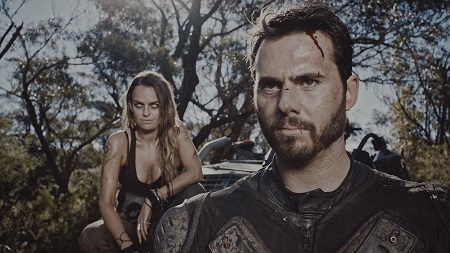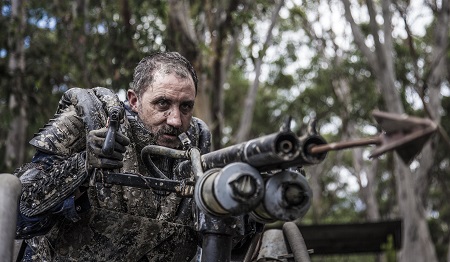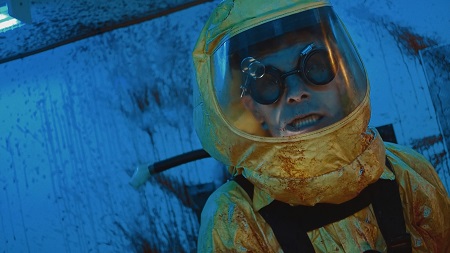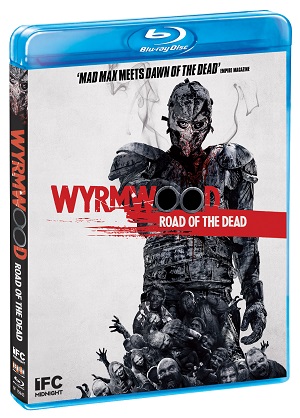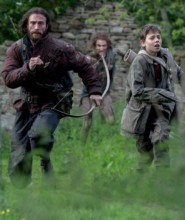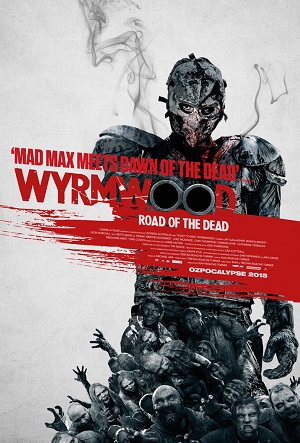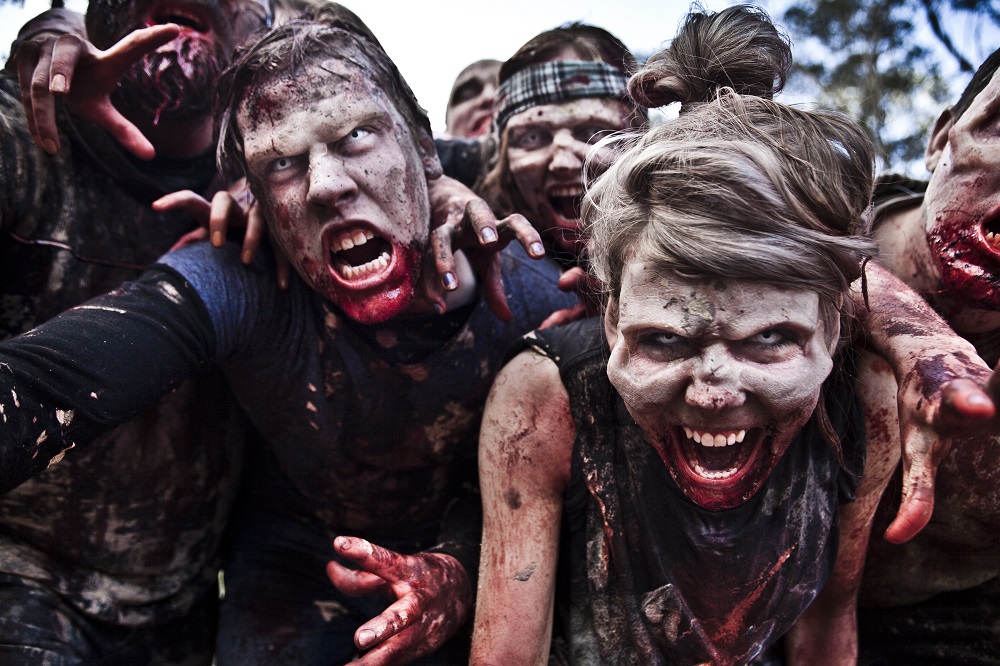
“Wyrmwood: Road of the Dead” – Interview with Director Kiah Roache-Turner
by Sara Michelle Fetters - February 23rd, 2015 - Interviews
A ‘Very Australian’ Wyrmwood
Director Kiah Roach-Turner Takes Zombies Into a Mad Dystopian Wasteland
It’s no secret I’m a big fan of the Aussie zombie apocalypse import Wyrmwood: Road of the Dead. It’s fast, funny, chock full of terrific ideas and features star-making performances from Jay Gallagher and Bianca Bradey. Directed and co-written by first-time filmmaker Kiah Roach-Turner, the film is a warped, wickedly inspired fusing of Mad Max and Dawn of the Dead set in a world that’s decidedly familiar yet that’s also amusingly off its rocker. Talking with the filmmaker shortly before its theatrical release, his excitement was genuinely palpable.
“This is the day before the film gets released in both Australia and the U.S.,” says Roach-Turner with a jovial chuckle. “So you could say I’m doing pretty good. Heck, I’m on Cloud Nine.”
He’s got good reason to be in good spirits. The film met with enthusiastic responses from festival audiences, while a number of critics, including those at Variety, in The New York Times and at the Village Voice, have been exceedingly positive in their reviews.
“The reception of the film is better than anything I could have hoped for,” he instantly responds. “It’s a funny thing; this is a very Australian film. The humor. The way we put it together. The places we took inspiration from. It’s all pretty Aussie. We’ve taken it to Sweden, and they seemed to love it. We’ve shown it here in America and everyone here seems to love it. But even then we were still worried about showing the film back home.”
“Well, we premiered the film last week to 1,500 very happy, very drunk Australians and they went nuts for it. Let me tell you, I breathed such a massive sigh of relief. The home crowd loved it. Everything else is just a bonus after that.”
It’s obvious while watching just how much a debt Wyrmwood owes to George Miller and his Mad Max trilogy. From the villains, to the hero’s costumes, to the souped-up vehicles, all of it bears a resemblance to that iconic series. With that in mind, it goes without saying Roach-Turner was a fan of the veteran, Oscar-winning Australian director from a very early age.
“Big time,” he proudly proclaims. “I just hope George doesn’t sue us for aping that sort of [Mad Max] style. It’s just one of those things. When you’re making a film about a zombie apocalypse and you’re in Australia you almost can’t help but put people in those leathers and those helmets; you just have to put spikes on the cars. At the same time you have to do things to make those things unique, give them your own signature style. It’s one thing to pay homage and another to just be copying the guy. I hope most will feel we were able to do the former.”
Not that taking a chance on zombies in the midst of all this dystopian Mad Max carnage wasn’t a risk. From “The Walking Dead” to World War Z, to a random movie of the week made for the SyFy Channel to numerous low budget efforts released straight to DVD, zombies are everywhere, and the thought a saturation point had been reached and putting more undead fuel on the fire was overkill certainly lurked in the back of the filmmaker’s mind.
“We thought that even back in 2010,” laughs Roach-Turner. “That’s when my brother [and co-writer] Tristan and I were coming up ideas for a film. Four years later, here we were pitching a zombie apocalypse film. When we sat down, though, we knew with our first film it was going to be zombies whether the world needed another zombie film or not. To make a zombie film, all you really need are a bunch of friends willing to wear a lot of hideous makeup and a big bucket of fake blood.”
“But then my brother came up with this great idea about zombies breathing gas that we could power all these Mad Max-style vehicles on, and after that the creative juices just got flowing. I think we were able to get most of what we were excited about shot and on film. I was watching the dailies as we were putting things together and I was really happy. It’s an oversaturated genre, yes, but we felt these ideas were just so good that we had to explore them.”
It’s those ideas, the loopy ingenuity of them all, which makes Wyrmwood what it is. Roach-Turner and his collaborators didn’t follow a set pattern as they constructed their tale, allowing their imaginations to soar as they figured out exactly what it was they wanted to do and what story they wanted to tell. To put it bluntly, they broke the rules, writing their own book as they gleefully went along.
“I think that’s one of the things that make first films kind of cool,” states the director. “I’m in my 30s now and I’ve wanted to make films my entire life, dreaming of scenarios and how it would all come together. So when you get there, when you’re putting it all together, it’s such a high-energy, high-velocity sort of thing, that’s probably why so many first films feel so exciting, so different. You’re so energized to finally be out there shooting all the filmmaking rules you’re supposed to be following no longer seem to matter. I mean, we tried everything in the book. When that didn’t seem to be working, we started writing our own book. That’s a first film.”
“I do think rules are good,” Roach-Turner goes on to explain. “Good, that is, until they aren’t any good. One of the great things about self-funding your own first film is that you are your own boss, so really you’re the only authority as to whether things are working or not. There’s no one looking over your shoulder. What happens within the studio system or if you’re working with other people’s money is that they want you to do what has worked before; they don’t want you to take any chances and follow the rules.”
“What we did was break them all because there was no one there to tell us not to. I think that’s where the originality comes with this film and it wouldn’t be there had we made it inside a studio system.”
At the same time, Roach-Turner knew what he was crafting shouldn’t all be filled with lunatic sensationalism. It was important to ground things, to give the proceedings an emotional heft, and as such he and his brother constructed a gut-wrenching opening sequence that blew me away.
“You’ve got to start the film with a punch,” says the filmmaker. “It’s important in this genre to make sure there’s emotional heft to what’s going on. You have to start with a bang. You have to believe Barry is in definite danger. You have to get your audience to strap in, grab their arm rests and be ready for a ride as we step on the accelerator.”
“Listen, I watch a lot of films. To make films, I think you’ve got to be a big fan of films yourself. If a film doesn’t grip me, doesn’t take me someplace new or different, or at the very least do something in a new or different way, then I get a little angry. I don’t want two hours of my life wasted. So as a director, I take this job and this genre very seriously. I know we’re not reinventing the wheel but that doesn’t mean we still can’t make a good film. I want the audience to be involved right away. It’s necessary. I want to give them a fun ride where life and death matter.”
“It’s very fine line,” he continues candidly, “because, quite frankly the film itself is preposterous. It’s fun, and it moves at a zippy pace, but it’s still a zombie film, and that fact is always there playing at the back of your mind. But, while the film is weird, while some of the stuff is just plain crazy, if you don’t take the characters seriously, if you don’t think they’re real, then none of the crazy, outright bizarre stuff matters. People would just nod off.”
“I mean, the majority of zombie movies are just out-and-out silly, right? I’m much more interested in something that takes itself seriously while it’s still able to poke fun and play with the genre, so having that stuff with Barry (the film’s main character portrayed by Gallagher) early on was important to me. The bleak, black comedy aspect of the film can be pretty outrageous but all of the main characters themselves are real. They’re genuine. These are real people trapped in this bizarre, outrageous situation. It had to be that way otherwise the movie just wouldn’t work.”
A big part of that bizarre outrageousness is the performance by Berynn Schwerdt. He portrays a character known only as The Doc, his cockamamie urgent lunacy enough to make my skin tingle and send my nerves jangling to the point of being severed in two. Yet he fits inside this world brilliantly, his constant poking and prodding of Barry’s firebrand of a sister Brooke – wonderfully portrayed by Bradey – so insidiously disquieting there probably should be a law against such things.
“All the best villains are wonderful comedians,” proclaims Roach-Turner. “If you go back and look at the original Mad Max that’s exactly the way it was. Look at the Toe-Cutter. He’s a funny character. He’s insane. He’s almost lovable. Yet he’s also terrifying, and it was important to me to have one of those crazy, iconic dystopian Australian bad guys here in Wyrmwood.”
“The other thing to remember, zombies are kind of boring. All they do is growl and bite. We knew we needed some sort of human element in order to increase the feeling of danger. It’s from that need that The Doc was born out of, and Berynn just delivered in so many ways. He never got a take wrong. His improvisations were constantly genius. Even when he’s in the background you can’t take your eyes off of him. He added that distinctly Aussie villain element we were going for. Working with him was just a dream.”
Schwerdt makes the character sing, taking what was on the page and transforming it into a symphony of triumphant unpleasantness. “It was all pretty scripted, but he brought something to the film that wasn’t initially there,” the director admits. “We’d written the horror. We’d written the comedy. We’d written the absurdity. But what [Berynn] brought was this horrible creepiness. The way he crawls up into Bianca’s personal space and whispers little things. How he would fill the frame in these odd, idiosyncratic ways. It really creeped everyone, the whole cast and crew, out. But Berynn is just a great actor. He makes the character so memorable even though he only has a small handful of lines.”
But in the end it is the trio of Gallagher, Bradey and Leon Burchill – playing a fellow survivor named Benny who makes fast friends with Barry – who help make the movie what it eventually turns out to be. All of them are outstanding, showcasing an easygoing, magnetic chemistry that allows a personal connection between the viewer and the characters they’re portraying to happen right away.
“They’re the triumvirate,” says Roach-Turner. “They’re the heart and soul of the film. Yet they’re also all very different. Leon has this crazy hair and this distinctively indigenous personality, just a bizarre, wonderful character in his own right. Then you’ve got Bianca, who looks like some kind of gloriously gorgeous art student slash Goth rocker who could toss you down a flight of stairs and not even look back to make sure you’re okay. As for Jay, he’s just this classic, ruggedly handsome Australian male. You can’t take your eyes off of him. They all have three distinctive styles and looks to them yet they’re also breathtakingly talented, and as such I think they make a pretty hot threesome of heroes. They just all look fantastic together.”
For my money, Gallagher is a star in the making. He’s got the same sort of carnal, ferociously masculine presence that helped transform the likes of Mel Gibson, Russell Crowe and Hugh Jackman into international sensations. “I’m going to tell him you said that,” laughs the director, “that’s going to make his day. But, yes, you’re right. Jay is just so talented. He’s the real deal. He’s got this serious side to him that’s grave, that’s mesmerizing, but at the same time he can embrace the absurdity of the film in a way that feels oddly believable and authentic. He can do the Mel Gibson Mad Max stuff but he can also do the Bruce Campbell Evil Dead stuff, too. I loved working with him. He’s got this magnetism that just pops on-screen. I feel so lucky to have had him in the film.”
There’s an early sequence involving an escape from the city that proves just how gigantic Gallagher’s potential is. Stranded outside a darkened tunnel, his car broken down, left on the side of the road, Barry reflects on an unspeakable tragedy that has just befallen him and his loved ones, giving weight and meaning to the character’s travails while also cementing just how high the stakes for him and his trapped sister are.
“That was one of those scenes where the cast and crew kind of lost it a little,” he recollects. “Everyone just started tearing up. Jay just really nailed it, and I think that sets the emotional tenor for all that happens throughout the rest of the film. Once that horrible scene in the car occurs you do feel like anything can happen to any of the characters from that point on. After we shot it, Jay sort of wandered off on his own and he was obviously shaken. He just shot take after take, real tears, real emotion, and that’s because it was a real intense moment for him as he was also dealing with a recent loss that he ended up drawing from in order to shoot the scene. It was powerful.”
“Most crazy, whacky zombie films similar to ours, they’re just interested in the gore, in the head explosions, and I’m honestly not into all of that. I’m into filmmaking. My favorite scenes are the scenes between actors interacting in real ways that audiences can relate to. The gore is fun, it’s fun to shoot and to come up with all of that sort of stuff, but none of that would matter to me if the characters and the emotions didn’t feel authentic. Watching Jay and the other actors embrace that, to see they were willing to go to those places in such a silly zombie film; that was just the best as far as I was concerned.”
When all is said and done, the director is understandably eager for general audiences to finally get a look at his debut, he just hopes they get the opportunity to see it the way he intended and that’s in a theater filled with fellow moviegoers. As for what they’ll think when it’s over, on that front he’s a lot more coy.
“Look, this is a film that plays better with an audience,” states Roach-Turner implicitly. “It’s just more fun. There are so many wow moments, so many gasp moments, so much funny stuff, to see it with an audience is just better, in my opinion.”
“But I don’t know what I want audiences to be talking about after they see it. That’s not up to me. One of the things about making a film is that you don’t have a say. You put it out into the world and then the world gets their chance to decide. It’s out of my hands now, and that’s okay. It is my baby, and I do love [Wyrmwood] like a child, but unfortunately I can’t decide how people are going to feel about it. I guess I just hope they like it. That would be enough.”
– NOTE: This interview re-edited and re-posted on Aug. 3, 2015. Feature originally uploaded on Feb. 23, 2015.
ADDITIONAL LINK:
“Wyrmwood: Road of the Dead” Blu-ray Review by Sara Michelle Fetters
